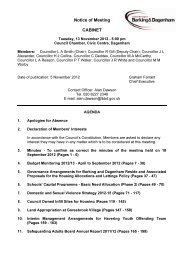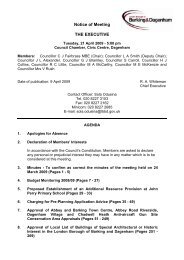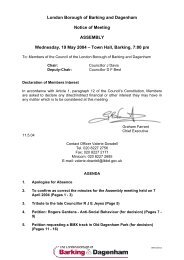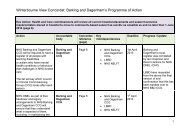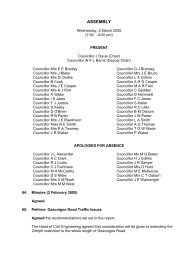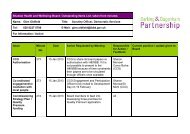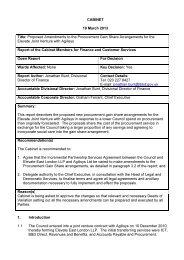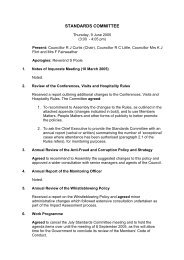Speach and Language Therapy (SALT) - Meetings, agendas, and ...
Speach and Language Therapy (SALT) - Meetings, agendas, and ...
Speach and Language Therapy (SALT) - Meetings, agendas, and ...
Create successful ePaper yourself
Turn your PDF publications into a flip-book with our unique Google optimized e-Paper software.
The Directorate made a bid for £300,000 to fund this increase in staff through<br />
the PCT/LDP process but this was not successful. However, this increase<br />
would have been for all three boroughs <strong>and</strong> would still have left Barking <strong>and</strong><br />
Dagenham Borough with a shortfall.<br />
Law (2000) emphasised the importance of collaboration between local<br />
education authorities <strong>and</strong> health at a managerial level in the strategic planning<br />
of services if inclusion was to be successful. He referred to the recent<br />
St<strong>and</strong>ards Fund money which services should actively bid for as a means of<br />
improving speech <strong>and</strong> language therapy provision in mainstream schools.<br />
2.2.5 Working in schools<br />
The move towards supporting children in their school environment was<br />
acknowledged. Therapists needed to become familiar with the dem<strong>and</strong>s of<br />
the curriculum <strong>and</strong> learn how to adapt their activities accordingly, so that<br />
therapy targets could be included in a child’s normal day wherever possible.<br />
It would also be very helpful for all therapists working in mainstream schools<br />
to have a clear underst<strong>and</strong>ing of the borough’s Primary English Project <strong>and</strong> to<br />
see how therapy aims can be fitted into it. Therapists also need to be able to<br />
provide on-going training for all staff in every school that will help them to:<br />
• Better underst<strong>and</strong> the needs of children with a speech, language or<br />
communication difficulty<br />
• Underst<strong>and</strong> what strategies they can use to support the children<br />
• Be more aware of normal speech <strong>and</strong> language development<br />
• Know whether a child has a difficulty or not<br />
• Use a range of activities that promote speech <strong>and</strong> language development.<br />
These areas of training need would fit in well to the aims of the Joint<br />
Professional Development Framework. This is a project funded by the DfEE,<br />
(now the DfES) to enable teachers <strong>and</strong> speech <strong>and</strong> language therapists to<br />
work effectively with children with speech <strong>and</strong> language <strong>and</strong> communication<br />
needs in an educational setting. This was to be achieved by creating an<br />
outline of professional development that could be undertaken jointly <strong>and</strong><br />
collaboratively by both professional groups.<br />
Early Years<br />
The speech <strong>and</strong> language therapy department needs to develop flexibility in<br />
its work places <strong>and</strong> work closely, not only with EYDCP, but also with Health<br />
Visitors whose focus is usually those who are not yet in any form of preschool<br />
provision. It needs to look at parent programmes such as Hanen <strong>and</strong><br />
the Parent-based Intervention Programme (Gibbard 1998), as well as<br />
programmes designed to improve early identification <strong>and</strong> intervention.<br />
Screening<br />
A number of schools mentioned that this would be useful. The development<br />
of a screening assessment that is sensitive enough to pick up the children<br />
who need it, but yet quick enough to be viable would be a very interesting<br />
project. This development could be ongoing over the next few years,<br />
provided SLTs have caseloads small enough to make it feasible.<br />
18



